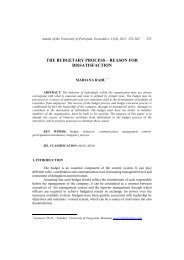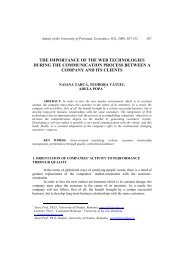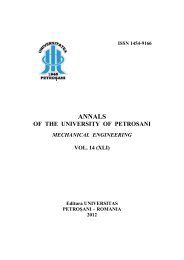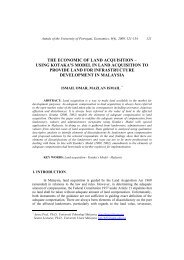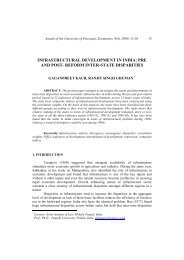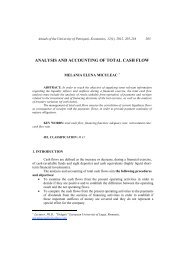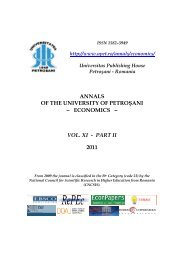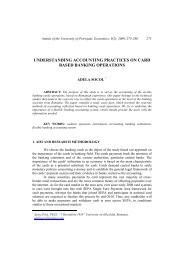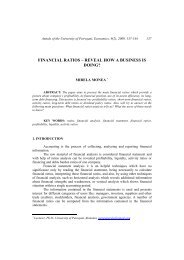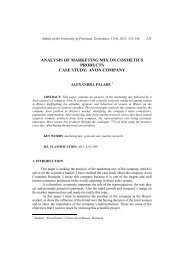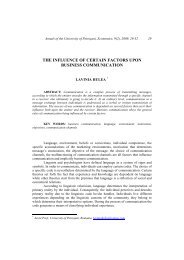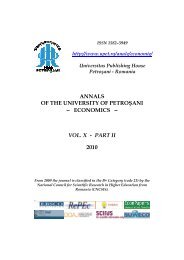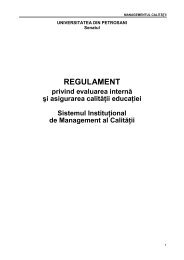annals of the university of petroÅani â¼ economics â¼ vol. xi - part i ...
annals of the university of petroÅani â¼ economics â¼ vol. xi - part i ...
annals of the university of petroÅani â¼ economics â¼ vol. xi - part i ...
You also want an ePaper? Increase the reach of your titles
YUMPU automatically turns print PDFs into web optimized ePapers that Google loves.
212 Popovici (Bărbulescu), A.<br />
analytical (causal) style, quite because this one is appropriate to us and we own it. We<br />
should not change it with a foreign one, which is inappropriate for us: it is exactly <strong>the</strong><br />
reverse <strong>of</strong> our own thinking system.<br />
Education and formation are fundamental investment for <strong>the</strong> future <strong>of</strong> nations.<br />
This feature was forgotten in Romania, by too many reforming transformations, despite<br />
<strong>the</strong> absence <strong>of</strong> a coherent, agreed by all <strong>the</strong> forces <strong>of</strong> <strong>the</strong> country, strategy – we do not<br />
have a coherent strategy (Jivan, et al., 2010, p. 220).<br />
Usually, in <strong>the</strong> functional market economies, <strong>the</strong> best people are <strong>the</strong> best paid.<br />
Having bigger financial power than <strong>the</strong> public institutions, based on <strong>the</strong> funds collected<br />
from <strong>the</strong> tax payers, and providing good wages, private teaching institutions gain <strong>the</strong><br />
best teachers and have <strong>the</strong> most performing teaching tools. Image and fame <strong>of</strong> teaching<br />
institutions is consistent with this same hierarchy – in <strong>the</strong> favour <strong>of</strong> <strong>the</strong> private ones.<br />
In Romania, wages differences between private and state teaching institutions<br />
were not so big after 1989: <strong>the</strong>y could not counteract <strong>the</strong> image; and this is plainly in<br />
<strong>the</strong> favour <strong>of</strong> those having tradition – <strong>the</strong> state ones. After 1989, private teaching<br />
institutes are too seldom big businesses. Most <strong>of</strong> <strong>the</strong>m are organized at a <strong>university</strong><br />
level, addressing to clients having already <strong>the</strong>ir own incomes – and less to those<br />
sustained by <strong>the</strong>ir parents. Those clients, businessmen <strong>the</strong>mselves, thinking practically,<br />
materialistically, like in business, if <strong>the</strong>y pay, <strong>the</strong>y want to buy something “concrete”<br />
(material): such individuals (honest buyers on <strong>the</strong> market) cannot imagine to give<br />
money for watching some <strong>the</strong>oretical considerations <strong>of</strong> some “philosophers” <strong>university</strong><br />
pr<strong>of</strong>essors; but <strong>the</strong>y want to get a diploma, by <strong>the</strong>ir money: <strong>the</strong>y do not think<br />
philosophically or at elevate intellectual principles level (that is what <strong>the</strong>y are<br />
interested in, not knowledge itself). This is our market: market works with priority to<br />
any supposed principles or imposed regulations: everything is sold and everything can<br />
be bought (Jivan, et al., 2010, pp.222-223).<br />
The <strong>university</strong> research tends to diminish its level: grants are given for services<br />
and activities at <strong>the</strong> usual level <strong>of</strong> <strong>the</strong> industrial manufacturing enterprises; but <strong>the</strong> high<br />
level research is not appreciated enough anymore: <strong>the</strong> recent market system and <strong>the</strong><br />
system <strong>of</strong> gaining grants are not rewarding enough such projects, but ra<strong>the</strong>r some not<br />
that pr<strong>of</strong>ound (<strong>the</strong> short run most directly applicative ones are preferred). The highest<br />
level ones remain unpaid and, as a result, <strong>the</strong>ir number is diminishing and <strong>the</strong> best<br />
specialists are diminishing <strong>the</strong>ir qualification levels or <strong>the</strong>y are living Romania, trying<br />
to valorise <strong>the</strong>mselves elsewhere.<br />
After 1990, <strong>the</strong> former very performing educational Romanian system became<br />
a problem, because <strong>of</strong> <strong>the</strong> diminishing standards and loosing position in international<br />
classifications. Its performance was not keeping with our doubtful economy; <strong>the</strong>refore<br />
market mechanisms won and <strong>the</strong>y strongly entered in <strong>the</strong> Romanian educational<br />
system, diminishing its quality. It looks like, in <strong>the</strong> poorest countries, <strong>the</strong> economy is<br />
not ‘suitable’ for education and instruction.<br />
These are some long run effects <strong>of</strong> <strong>the</strong> propensity to <strong>the</strong> most free<br />
(deregulated) market laws in <strong>the</strong> pr<strong>of</strong>ound destruction (perverting, degrading, abasing,<br />
in <strong>the</strong> Aristotelian value meaning) <strong>of</strong> <strong>the</strong> human being (in <strong>the</strong> most human features this<br />
kind <strong>of</strong> being can have); just like <strong>the</strong> effects concerning <strong>the</strong> planet destructions, it is



